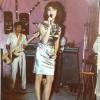I am at a loss as to what all this means. (Incidentally, I ordered the book which is supposed to be delivered on 8/28.)
Nothing like that happened. There was only one day and it began at 1PM and ended at 7PM, right on schedule. No one from Horace's band showed up except Everett Brown and Ray Draper (thanks for the clarification, Nico). No one "went off" on anyone and Sonny did not get drunk. No "crazy" no "screaming" no "hollering". No one walked out of the studio. As I have said, Sonny, not Don Schlitten, hired the band. Horace was thoroughly professional throughout the session, although clearly not an experienced conductor. I remember him, head down, leafing through the scores, grinning nervously when the union rep showed up.
Horace must have been paid pretty well for his work. ("We had paid bills and got out of some problems.") Remember that he was not yet established ("We had rehearsed every day, all day, because we had nothing but time. There wasn't much else going on for us during the day.") and the opportunity to have his work recorded on a recognized jazz label with a soloist like Sonny (and well known jazz musicians like Tommy, Teddy, Al, Conte,) must have been a big boost.
Horace was a nice guy, quiet, a little shy. I knew him from LACC and a few dance gigs we had played (and ridden to) together. He seemed slow to anger and when he did it would simmer rather than erupt. Maybe I just didn't know him well enough to see another side to him or maybe there wasn't any. I don't know what to make of the passage quoted above.

_forumlogo.png.a607ef20a6e0c299ab2aa6443aa1f32e.png)


